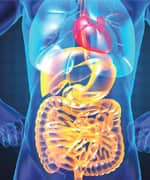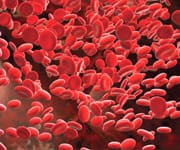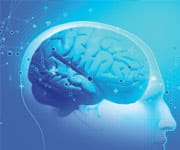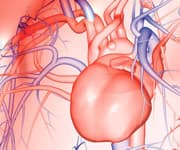Life Extension Magazine®
Fish-Eating Vegetarians Have Lowest Risk Of Colorectal Cancer | |
A study published in JAMA Internal Medicine found eating a plant-based diet that includes fish significantly reduces the risk of colorectal cancer, the second leading cause of cancer-related deaths in America.* Researchers from Loma Linda University tracked 77,659 men and women from Seventh-day Adventist churches for seven years. (Adventists were chosen because they abstain from smoking and drinking, and typically follow a vegetarian diet.) Participants filled out a questionnaire regarding over 200 food item choices. During follow-up, scientists found 490 cases of colorectal cancer (380 cases of colon cancer and 110 cases of rectal cancer). After adjusting for many health and behavioral variables, scientists say vegetarians who included fish in their diet had a 27% reduced risk of contracting colorectal cancer. Compared to non-vegetarians, those who consumed fish once or more a month—and other meats less than once a month—reduced their risk by 43%. Editor’s Note: The authors of the study suggest that omega-3 fatty acids may be the key to such a low risk of cancer in the fish-eating group. |
|
| Reference | |
* JAMA Intern Med. 2015 Mar 9. |
|
Breast Arterial Calcification A Strong Indicator Of Coronary Arterial Calcification | |
|
A study presented at the annual meeting of the American Roentgen Ray Society found that mammograms can be an aid for heart risk assessment.* Having calcium deposits in the coronary artery correlates with cardiovascular disease and death. Researchers wanted to determine if breast arterial calcification might correlate with coronary artery calcification. Study author Dr. Laurie Margolies of Icahn School of Medicine at Mount Sinai, looked at imaging results from 371 women who had a digital mammogram and a chest CT scan performed within one year of each other. From the mammograms, researchers derived a score based on the number of blood vessels affected and the extent of calcification. Coronary artery calcification scores were obtained from CT scans. The researchers found that in 76% of the women, those with a breast arterial calcification score of 0 also had a coronary artery calcification score of 0. As the breast arterial calcification score went up, there was a corresponding rise in the coronary artery calcification score. The findings indicated the presence of breast arterial calcification may play a role in identifying women with coronary artery disease without additional time, cost, and exposure to radiation. Editor’s Note: “The opportunity to diagnose cardiovascular risk on mammography heralds a paradigm shift in imaging,” said Dr. Margolies. |
|
| Reference | |
* American Roentgen Ray Society Annual Meeting, Toronto, Canada. April 19-24, 2015. |
No Link Between Calcium Supplements And Coronary Artery Calcification In Rheumatoid Arthritis Patients |
An article published in Arthritis and Rheumatology found that supplementing with higher levels of oral calcium was not associated with an increased risk of coronary atherosclerosis in rheumatoid arthritis patients.* According to a large cohort study of 145 patients with rheumatoid arthritis between the ages of 45 and 84, baseline coronary artery calcification scores less than 100 units—which is a strong indicator of future cardiovascular events—were 70% less frequent among study participants who took 1,000 mg or more per day supplemental calcium than in those who consumed less than 1,000 mg a day. Approximately 29% of patients were taking at least 1,000 mg of supplemental calcium a day while the remainder were taking less than 1,000 mg a day. A coronary artery calcification score of less than 100 units was documented in 30% of patients at baseline and 34% of patients at the third visit. Editor’s Note: “To our knowledge, this is the first study to explore the association of oral calcium supplementation with coronary artery atherosclerosis in rheumatoid arthritis patients,” said study author Laura Geraldino-Pardilla, MD, of Columbia University in New York City. |
|
| Reference | |
* Arthritis Rheumatol. 2015 Mar 25. |
|
Omega-3 Helps Heart Attack Survivors | |
The American College of Cardiology’s 64th Annual Scientific Session was the site of the presentation of the finding of a benefit for omega-3 fatty acids in patients recovering from heart attack.* Raymond W. Kwong, MD, MPH, and associates randomized 374 heart attack survivors who were given standard therapy to receive 4,000 mg of omega-3 fatty acids or a placebo daily for six months. Blood samples were analyzed for omega-3 fatty acid levels and other factors, and cardiac magnetic resonance imaging was conducted at two to four weeks and at the trial’s conclusion. By the end of the trial, blood levels of omega-3 fatty acids had increased among 92% of the omega-3 group and ST2, a marker of the severity of adverse cardiac remodeling and tissue fibrosis, was reduced. Cardiac imaging results indicated that the omega-3 group experienced less deterioration in heart function in comparison with those who received a placebo. Editor’s Note: “Omega-3 fatty acids may have anti-inflammatory effects and also promote better cardiac healing,” commented Dr. Kwong, who is the director of cardiac magnetic resonance imaging at Brigham and Women’s Hospital. “This is important because other anti-inflammatory agents, including steroids and NSAIDs, have failed to make a difference after myocardial infarction.” | |
| Reference | |
* 2015 American College of Cardiology’s 64th Annual Scientific Session. | |
Low Levels Of Omega-3 Linked With Increased Risk Of Intracerebral Hemorrhage | |
|
Researchers at Japan’s Tokai University School of Medicine report a protective effect for the omega-3 fatty acid eicosapentaenoic acid (EPA) against the risk of intracerebral hemorrhage, which is characterized by bleeding in the brain. The findings were published in the March 2015 issue of the journal Nutrition Research.* The study included 70 participants who had an intracerebral hemorrhage within 30 to 60 days, compared to 66 controls. Fasting blood samples were analyzed for plasma EPA, docosahexaenoic acid (DHA), arachidonic acid (AA), and other factors. A dietary questionnaire provided information regarding participants’ consumption of fish (the most common source of omega-3 fatty acids), as well as other information. Subjects who had been diagnosed with intracerebral hemorrhage had significantly higher diastolic blood pressure and other factors, lower EPA levels, and a lower average ratio of EPA to AA. Further analysis of the data revealed that low EPA was a risk factor for those 65 and older. Editor’s Note: While omega-3 fatty acids have been linked with protection against ischemic stroke, their ability to help reduce blood clotting has led to speculation that the fatty acids could increase the risk of hemorrhagic stroke, which the current finding contradicts. | |
| Reference | |
* Nutr Res. 2015 Mar;35(3):214-20. | |
Pharmacist Survey Shows Increased Use Of Compounded Hormones | |
According to an analysis of a recent survey of nearly 500 pharmacists, nearly half of all prescriptions for menopausal hormone therapy are custom-compounded, non-regulated “bioidentical” hormones, which are mixed for each individual according to her doctor’s prescription.* Since a 2002 Women’s Health Initiative study linked traditional hormone therapy to increased health risks postmenopausal women have been seeking safer alternatives. Customized bioidentical hormones are often marketed as safer alternatives to FDA-approved hormone therapy, with fewer side effects. The Endocrine Society, however, says there is no scientific evidence supporting the safety or effectiveness of compounded bioidentical hormones. Lead researcher JoAnn Pinkerton, MD, a professor of obstetrics and gynecology at the University of Virginia Health System, Charlottesville, sent surveys to 12,250 pharmacists who provide compounding services. Of those pharmacists who responded, 69% said they expected their hormone therapy compounding services to grow over the next two years. Editor’s Note: Dr. Pinkerton cited statistics from Symphony Health Solutions stating that in 2012, there were 36 million FDA-approved prescriptions for HT; that number is down 61% from 2002. | |
| Reference | |
* 2015 Mar 6. Endocrine Society’s 97th Annual Meeting. | |
How Vitamin E Deficiency Damages The Brain | |
On April 8, 2015, the Journal of Lipid Research published an article which explains how a sufficient intake of vitamin E could help protect the brain from lipid peroxidation and its damaging effects.* Maret G. Traber and associates at Oregon State University evaluated the effects of lifelong vitamin E deficiency in zebrafish. After nine months of consuming a diet with or without vitamin E, the brains of the fish were examined. The team observed a reduction of approximately one-third in the brain cell membrane component DHA-PC in fish fed the vitamin E-deficient diet in comparison with those whose diets were sufficient. Deficient fish also had a level of lyso PLs—needed for getting DHA into the brain—that averaged 60% less. Hydroxy-DHA-PC 38:6 was higher in deficient fish, indicating increased peroxidation of DHA, which is an omega-3 fatty acid. Editor’s Note: “This research showed that vitamin E is needed to prevent a dramatic loss of a critically important molecule in the brain, and helps explain why vitamin E is needed for brain health,” Dr. Traber stated. “Human brains are very enriched in DHA but they can’t make it, they get it from the liver. The particular molecules that help carry it there are these lyso PLs, and the amount of those compounds is being greatly reduced when vitamin E intake is insufficient. This sets the stage for cellular membrane damage and neuronal death.” | |
| Reference | |
* J Lipid Res . 2015 Apr 8. | |
Research On Metformin’s Anticancer Effect | |
The Proceedings of the National Academy of Sciences published the outcome of research that helps explain the anticancer effects of metformin observed in men and women with diabetes. Meta-analyses of epidemiologic studies have uncovered a 30 to 40% reduction in cancer incidence among diabetics who use metformin in comparison with other drugs; however, its anticancer mechanisms have not been well studied.* Researchers examined the effect of metformin on immune system cells known as CD8+ tumor-infiltrating lymphocytes. Due to repeated stimulation during chronic infectious disease and cancer, these cells are known to undergo immune exhaustion, which is characterized by a reduction in cytokine production and the cells’ eventual elimination by apoptosis, accompanied by the expression of specific markers. The researchers describe a series of experiments in which metformin enabled animals to reject solid tumors while CD8+ tumor-infiltrating lymphocytes were increased and protected from exhaustion and apoptosis. | |
| Reference | |
* Proc Natl Acad Sci U S A. 2015 Jan 26. | |
Testosterone May Help Patients With Prostate Cancer | |
The January 7, 2015, issue of Science Translational Medicine describes a study conducted at Johns Hopkins University School of Medicine that found a benefit for treatment with testosterone in patients with metastatic prostate cancer.* The study included 16 men with castration-resistant prostate cancer who were injected with 400 mg testosterone cypionate on the first day of three 28-day cycles. The subjects were also given the chemotherapy drug etoposide daily during the first two weeks of each cycle. Androgen deprivation therapy to suppress the body’s production of testosterone was then resumed. This allowed for cycling from elevated to near-castrate testosterone levels during the course of the study. Half of the 14 men who completed the study experienced reductions in prostate-specific antigen (PSA, a blood marker used to evaluate prostate cancer progression) and of 10 men whose cancer could be imaged, five experienced regression. Editor’s Note: Although the participants eventually experienced PSA progression, subsequent treatment with androgen-ablative therapies was successful in all who received it, which suggests that testosterone therapy as administered in the study may restore sensitivity to the drugs among those who have become resistant. | |
| Reference | |
* Sci Transl Med. 2015 Jan 7;7(269):269ra2. |
|
Increased Lycopene Associated With Lower Kidney Cancer Risk | |
The February 2015 issue of the journal Cancer reported a finding among participants in the Women’s Health Initiative (WHI) of a lower risk of renal cell carcinoma in association with greater intake of lycopene, which is found in red fruit such as watermelon and tomatoes.* Cathryn Bock, PhD, MPH, and associates analyzed data from 96,196 postmenopausal women who enrolled in the WHI from 1993 to 1998 and were followed through July 2013. Dietary questionnaires completed upon enrollment were analyzed for the intake of lycopene and other nutrients, and supplement use was ascertained in subject interviews. Two hundred-forty women were diagnosed with renal cell carcinoma over follow-up. Among women whose intake of lycopene was among the top25% of subjects, there was a 39% lesser risk of the disease in comparison with those whose intake was among the lowest 25%. Editor’s Note: Lycopene from food sources has also been associated with decreased risk of breast and prostate cancers, said Dr. Bock. | |
| Reference | |
|
* Cancer. 2015 Feb 15;121(4):580-8. | |
L-Carnitine Lowers Inflammation In Heart Disease Patients | |
The journal Nutrition reported the outcome of a trial of coronary artery disease patients, which found that supplementation with L-carnitine was associated with a reduction in markers of inflammation.* Thirty-nine men were given 1,000 mg L-carnitine or a placebo for 12 weeks. Serum inflammation markers C-reactive protein (CRP), interleukin-6 (IL-6), and tumor necrosis factor-alpha (TNF-a) were measured before and after the treatment period. Among those who received L-carnitine, all markers of inflammation were lower on average in comparison with the placebo group by the end of the study. Higher CRP and IL-6 levels were correlated with increased levels of oxidative stress. “We suggest that L-carnitine supplementation … may have potential utility to reduce inflammation in coronary artery disease,” Bor-Jen Lee, MD, PhD, and colleagues conclude. Editor’s Note: Dr. Lee and associates note that studies have shown that L-carnitine helps prevent oxidative injury in models of cardiovascular disease by reducing lipid peroxidation, scavenging hydrogen peroxide and superoxide radicals, chelating metal ions and upregulating the body’s defense system. | |
| Reference | |
* Nutr. 2015 Mar;31(3):475-9. |










